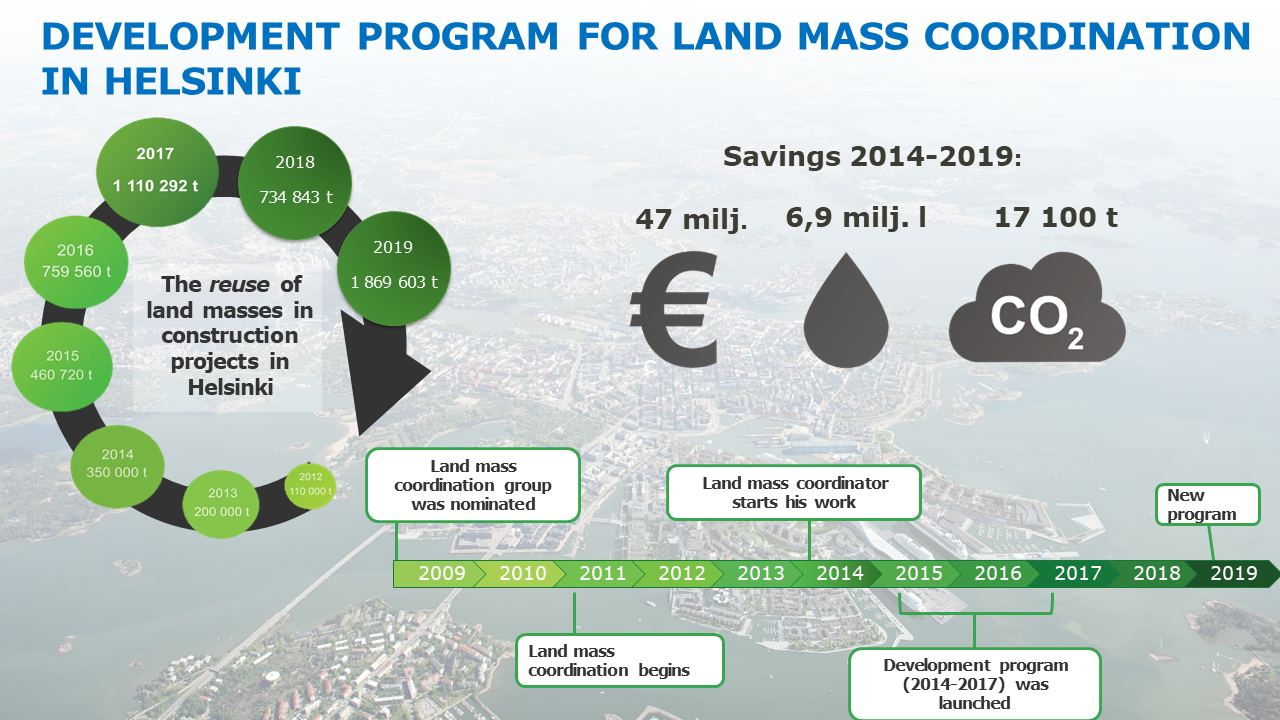Land Mass Coordination
Development programs for land mass coordination at the City of Helsinki
In Finland, the use of natural resources in building and construction works per capita is 2–3 times greater than the average in EU countries. The resource-wise use of rock and land masses has been recognized as one of the methods with the greatest potential for reducing CO2 emissions in urban planning and design. Construction works in Helsinki produce over 800,000 m3 of unspoiled surplus landmass annually, which was previously not utilized in the city. By better utilizing and reducing the amount of surplus land masses it has been possible for the City of Helsinki to save 5–10 million euros annually and achieve notable reductions in CO2 emissions.
In the early 2010s, the City of Helsinki was facing a need for a significant change in strategy regarding what to do with the surplus land masses generated from the fast-growing land development areas. One contributing factor was that the major landfilling areas for surplus land masses were closing. A full time land mass coordinator was recruited and the action plan for the years 2014–2017 was launched. This action plan was implemented fully with the help of the City of Helsinki’s investment funds. Other stakeholders that were essential for the success of this initiative were Helsinki Region Environmental Services Authority (HSY) and private sector operators.
Great savings have been measured between the years 2014-2019: 47 million euros, 6,9 million liters of fuel and 17,100 metric tons of carbon dioxide emissions. The reuse of land masses in construction projects had grown by over 1 million metric tons thanks to key actions taken during the development program.
Key actions 2014−2017
- A total of eight temporary land mass storage areas were set up in urban area for managing and processing land masses.
- Input into the City of Helsinki Master Plan process, involving mapping the network of storage areas in Helsinki. Coordination and utilization of land masses were also considered in the master plan creation phase.
- Utilization of land masses in street and park planning. Required coordination of both land mass surpluses and needs between projects and construction sites, also required defining the quality of soil.
- Pilot projects: landscaping Vuosaari dumping site, Alakivi Park, Ida Aalberg Park, construction sites along the coastline (fill sites), Sepänmäki and Jakomäki noise barriers.
- Starting collaboration:
- at national and regional level through the UUMA program to promote the use of recovered materials in groundworks
- with neighbor cities and Helsinki Region Environmental Services Authority (HSY).
- Environmental Impact Assessment of infrastructure planning and construction. Identifying the most relevant process phases from the environmental perspective and promoting sustainability in procurements.
- Promoting CO2 calculations in infrastructure projects. Case study and comparison of
four different calculation programs: Kivikko street project. - The reuse of land masses and crushed concrete (100,000 metric tons) in construction to avoid the use of natural resources.
~ 50% of total emissions of sub-base layer construction avoided
~ 15% savings in transportation costs
~ 20% savings in sub-base layers
New Development program
In 2019 the City of Helsinki launched a new development program The Principles for the Use of Land Masses, Rocks and Demolition Materials in Groundworks. Actions include a large range of processes, such as land acquisition and management, master planning, infrastructure planning, and design and construction works in Helsinki. The main targets of the new program are:
- reducing land mass excavation
- reducing CO2 emissions and other harmful environmental impacts occurring from construction
- promoting the reuse and recycling of materials (land masses, demolition materials etc.)
- ensuring sustainable final placement of low quality soils.
Contacts:
Mikko Suominen
Land mass coordinator
City of Helsinki
mikko.suominen@hel.fi

